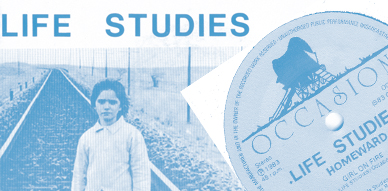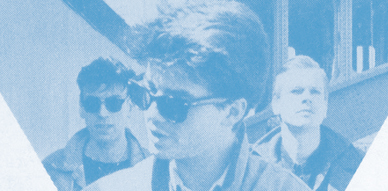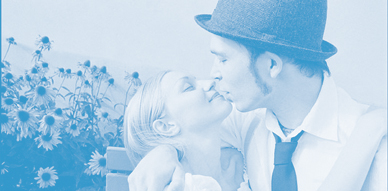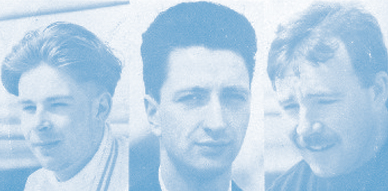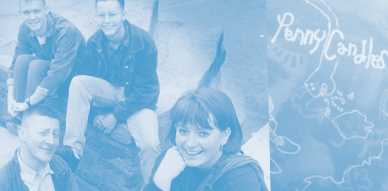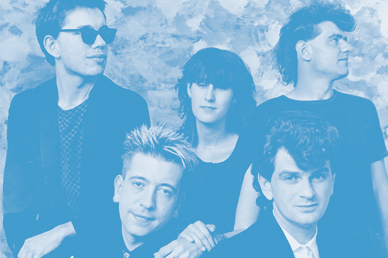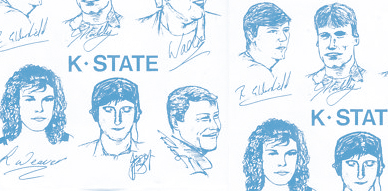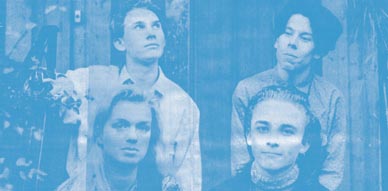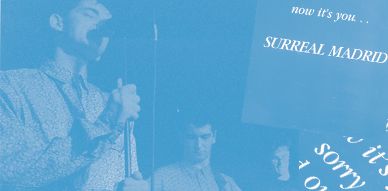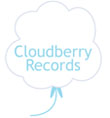Mar
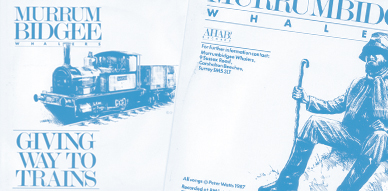
Thanks so much to Peter Watts for this great interview. The first time I heard “Giving Way to Trains” I was so surprised. It was such a fantastic song and I couldn’t believe it was THIS obscure. It deserved better. It deserved to be an indiepop classic. Happily I found his actual band, Spygenius, and Peter was kind enough to answer some questions for me. Hopefully now the Murrumbidgee Whalers are not that obscure anymore!
++ Hi Peter! Thanks for the interview! How are you doing these days? I see you are still involved with music through your band Spygenius! What surprises me is that you are still making guitar pop music! I guess this is the music you love the most? Why would you say is that?
Well, guitar pop was my first love, and it’s always stood by me! At a young age I got obsessed with the Beatles, especially circa 1965 / 1966 (yes, I know, so did everyone…). And then the Byrds, when I bought a 7” single which had Mr. Tambourine Man on one side and Turn, Turn, Turn on the other. I became completely besotted with the electric 12 string jangle and just wanted to make that noise – so at first I tried to find ways of making my six string sound like a twelve string, using lots or arpeggios and open strings, kind of like on Revolver, then I actually had a go a building an electric 12 string, out of an old neck from an acoustic guitar and some really cheap fender copy body. You could play it, just about, but it would only stay in tune for half a song… so as soon as I got some money I bought a proper one….
From the Beatles and the Byrds I got into psychedelia – all those West Coast bands – I love the folk and country influences and the big harmonies. But I guess as much as those sixties influences, the period in which I woke up musically was an era of classic intelligent British guitar pop – Squeeze, XTC, Elvis Costello, Ian Dury, the Smiths, the Jazz Butcher, Robyn Hitchcock – all of which seeped into my musical consciousness. And then alongside that there was the whole paisley revival thing in the 80s – the Rain Parade, Guadalcanal Diary, the Smithereens, Let’s Active, those sorts of chaps. And REM, I suppose, if you push me on it… so it was guitars all the way, and I just sort of joined in. Actually, there’s loads of other genres of music that I love too (all those classic Capitol easy listening tracks, and exotica), but the guitar is the only instrument that I’ve ever been able to master, so I guess that is another reason why my music comes out this way…
++ Tell me about Spygenius. What are the differences between it and the Murrumbidgee Whalers? How many releases you have? Do you play often?
Well the main difference is that Spygenius has managed to stay together for the better part of a decade instead of imploding under the stress of young egos clashing with each other! Also, we have a guitar-bass-drums-keys line up rather than a guitar-guitar-bass-drums line up. The full Spygenius line up is me (guitar), my wife Ruth Rogers (bass), Matt Byrne (Keyboards) and Alan Cannings (Drums). And we all sing. It started out with just me, Ruth and Matt working as an acoustic trio – we’d all been in bands before and seen them flourish and then fade away, and so I suppose our aim with Spygenius was really just to try to write, record and perform original music to the highest standard we could muster, for as long as we could get away with it! The acoustic thing was great, but I think we really came into our own as a group after we found Alan hiding in the van… I think another difference between Spygenius and the Whalers is that the whole approach is a bit more mature – the Whalers had a lot of ideas and energy and attitude, but Spygenius have a bit more in the way of knowledge and skill and experience. So there are some advantages to getting older!
We don’t play that often nowadays – usually we play in Canterbury (in the south east of England) where Ruth and I live, but we do venture out of the city from time to time – we usually play the International Pop Overthrow festival in London and Liverpool – and in fact last year we played at the IPO in Los Angeles which was a great experience – I think we’re a very English band, so it was relief and a joy that we went down OK with an LA crowd.
Spygenius has released three official albums to date, mostly recorded in our home studio – ‘Songs from the Devil’s Typist’, ‘Red Lounge’ and ‘The Comforting Suture’. We’re currently working on a fourth studio album, plus we recorded a couple of gigs a few months back, and as soon as we’ve tidied those recordings up a bit we’re going to release them, probably just as a download for hard core fans. Hopefully we’ll get them done before the IPO Liverpool in May.
++ And how come you decided to re-record “Giving Way to Trains” with your new band? Have you “recovered” some other songs from that period?
Giving Way to Trains has been part of Spygenius’s repertoire for a few years now so it made sense to record it, because the Whaler’s version didn’t really mean a lot to the folk who come to see Spygenius now. I think I originally wanted to put it in the set because ex-Whalers would occasionally come to Spygenius gigs, so I thought we could give them a little treat! And yes, Spygenius do play a lot of the songs that the Whalers used to – as I said before, we were all pretty young when the Whalers were going and I think quite often our ideas outstripped our ability to realize them – so it’s good sometimes to revisit a tune to try to finish the job. ‘Trains’ is a bit of an exception to that rule because the 7” exists, and so effectively I recorded a cover version of myself – which was a bit strange… quite pleased with the result, though.
++ About “Giving Way to Trains”, it’s such a great song, I think it should have been a classic. What’s the story behind this song?
Well, where should I start? I know it sounds like it’s about one particular relationship, but it’s not. In the UK Highway Code there is (or was, back in the 1980s, I haven’t checked lately) a line that says that at level crossings you should always give way to trains (or in American English, that you should ‘yield’ to trains). And it makes it sound so polite, like it’s just a matter of etiquette – but of course if you don’t ‘yield’ to the train you’ll get completely splattered into oblivion. And it seemed to me that that happens sometimes in life – that there are things you need to just walk away from even if you really don’t want to. And I have to admit that I’m not very good at doing that, and on occasions I’ve made a real mess of things because I haven’t known when to stop. So, the song is an aide memoir to me – don’t be an idiot: sometimes it’s better to walk away. (Although, having said that, sometimes, just sometimes, running in front of the train (metaphorically speaking), taking the risk and forgetting about the consequences, well, that can be what makes you feel alive… But no – I’m not going to advocate that! Don’t try this at home, kids! Safety first…) So there you go – existential conundrums explored through the medium of train related guitar pop – what could be finer!?
++ Let’s go a bit back to the early days of the Murrumbidgee Whalers. When did the band start and how did you all come together? How did you know each other? And you were based in Sussex then, right?
Actually we were based in Surrey, in a place called Carshalton Beeches which is about 14 miles south of central London (more of CB later!). ‘Sussex Rd’ was just the name of the street I lived in, with my brother who was also in the band.
Anyway, I guess the Whalers started with me and my brother learning to play guitars in our bedroom, where we used to bash through classic 60s pop tunes together. Then I decided to get together with some mates from school to form a band – I guess I was about 14 years old – and after quite few years and a lot of racket the Whalers emerged. There were a lot of line-up changes, but the classic line-up was me (guitar / vocals), my elder brother Chris (guitar, vocals, occasional faltering keyboards – brave man!), David Fisher (first bass, then drums and vocals) and Rob Telford (bass and vocals). I can’t actually remember how I got to know David – he was someone I knew of from the local musician scene and I think he replaced me on guitar in a side-project band that I’d been involved in. The first time we ever played together, I think, was in some sort of pick-up rock ‘n’ roll band playing on the fringe of a dodgy festival somewhere in the Midlands. I don’t remember it too well, because I was, well, let’s be honest, very drunk. He had a pink beard, was playing the drums that night, and fell off the stage along with his kit, which I thought was pretty rock ‘n’ roll, so it was fine by me. Anyway, I think we got to know each other after that, and when we lost our previous bass player, he asked to join and the rest is history. Rob I met through David.
Actually, though, the single of Giving Way to Trains was recorded by the previous line-up, with David on bass and a guy called Martin Gregory on drums. I think I met Martin because he was a friend of the younger brother of the guy I used to sit next to at school. Or maybe it was through a youth club? I’m not sure, but he was also part of the local musician scene. I always had an ear to the ground in those days for the names of people who were playing, you know, just in case you’d suddenly need a new drummer…
++ And who came up with the name? What’s the name about? I read there’s a river in Australia of the same name? But also a song by Harry Robertson?
I think we must have been named after the song, but not even realized it! Or at least I never did. I’d never heard of the song until just now when you asked the question and I looked it up on Youtube – the person who came up with the name was a former bass player I think (am I right, Simon? Was it you?) and as far as I remember we decided we liked it because of the idea of telling tall tales – obviously there are no whales in the Murrumbidgee, so if you’re claiming to be a Murrumbidgee Whaler then there’s got to be something fishy going on from the outset. That seems to be what the song is about, so I guess that was the original inspiration – I knew the story, but I’d just heard it as an anecdote, I didn’t know about the song. It kind of fitted us though, because there was always a bit of a folk influence in our music – people kept saying I sounded like Ian Anderson (which I never understood – although I did have a habit of standing on one leg on stage at that time…). In any case it was a terrible name for a band doing what we were doing because promoters couldn’t spell it (“Tonight! The Murrum Bridge Whalers!”) and / or they would think that we were a reggae band (“No, ‘Whalers’, not ‘Wailers’”).
++ So you released the one and only 7″, which you were telling me only 250 copies were made! That’s so little. How come you didn’t press more? And also, why weren’t there more releases by your band?
The original 7” was entirely self-funded and we didn’t have a lot of money, so we just pressed enough to use for promotion purposes. I seem to remember that we printed 500 sleeves, so that we could just get the discs done if we ever ran to another batch. We sent out loads of them to anyone we could think of – record companies, magazines, management companies – and got occasional nice reviews, but never really much interest. I seem to remember being invited to sit in the lobby of Chrysalis records for several hours before meeting someone for about 30 seconds, but it never came to anything. As for why there were no more releases, well I guess the band dissolving in a maelstrom of youthful egos didn’t help!
++ This release was self-released under Ahab! Records. I guess you were a big Moby Dick fan as well? Just to keep with the whale theme, right? How did you enjoy doing the label bit? Sending out records, promotion? How was your setup?
I’d really, really like to be able to claim that we called the label ‘Ahab!’ because Albert Camus presents the good Captain as an exemplar of the ‘absurd hero’. But I can’t. It’s not true. We did indeed use that name just to keep the whale theme going, and to be honest even now I still haven’t read the book. I have seen the ‘Dicky Moe’ Tom and Jerry cartoon, though, and that was a life-changing moment… In fact, ‘Ahab!’ wasn’t really a proper label, it was a marketing ploy to make the record look more official than it really was. I think we did consider turning it into a real label, but we were pretty naïve and never quite got our act together. I can’t really say much about our set up, because it was all pretty chaotic and hit and miss (mostly miss, to be honest…) – we’d send out and chase up the records ourselves – that’s the four of us plus our good friend James Kliffen who acted as our manager.
++ In this record the B side was “In a Garden” which I still haven’t had the chance to listen. But do tell me what is this song about?
Yes, hmm, In a Garden. Not a great song, which is one of the reasons why Spygenius has never picked it up, I suppose. Ghastly lovelorn teenage angst about a girl I dated way back in the last millennium. It has a folky tune, sung over a guitar part that sounds like Johnny Marr c1983 if he had joined the Cure. Actually that makes it sound better than it is. I have recently made an mp3 copy of the Whalers’ version, and keep planning to put it on Sound Cloud, then chickening out in the interests of public decency… not my strongest moment. I suppose it has some sort of naïve charm, but the lyrics are just awful. Not awesome, awful… but I will let you know if I ever do commit it to the internet…
++ “Giving Way to Trains” was also included in a 7″ compilation released by House of Dolls. How did this release came about?
Well, there’s the thing. None of us can remember. When you first contacted me about doing the interview I got in touch with David, Robert, Chris and James and everyone thinks that someone else in the band was responsible for sorting out that contact. David told me to ask Chris, Chris thought that James had set up the deal following a suggestion from David or Robert, Robert thought that James had set it up, but James doesn’t think it was his idea. I know it wasn’t mine! I know that somehow we got an interview for House of Dolls (which was conducted in a Buddhist Café in Croydon for some reason…?) and getting the track on the EP came from that – but how we got the interview? Sorry, none of us has any idea, it’s lost in the mists of time… this may partly explain why we never rose to any massive success: we were all very easily confused….
++ What about other recordings by the band? Are there any? Maybe lying in some demo tapes in someone’s cupboard?
Actually, they’re in a sideboard. Yes, the Whalers did record another four songs on 16 track, and I do have a quarter inch reel of tape which I think has these songs on, but I don’t have a reel to reel recorder, and anyway I think the tape would have to be baked or something before it can be played. I will get around to making digital copies of them one day. I can’t actually remember which songs are on there, but I think one of them was a song called ‘Heathen’ which is scheduled to be revisited on the next Spygenius release.
++ How was Carshalton back then? What were your favourite places to hang out? Did you go out there often? Or did you mostly commuted to London and see bands there?
Carshalton is an ancient village mentioned in the Doomsday Book. Carshalton Beeches, which is where I’m from, isn’t. It is mentioned in a Monty Python sketch, though. Carshalton Beeches is a mile or so up the road from Carshalton proper, and is an area where a lot of medium priced housing was put up between the wars, so that people could live there and commute to London. It centers on, and is actually named after, the railway station. In fact, the house that my brother and I grew up in backed onto the railway station. (And if you listen to Spygenius’s version of ‘California Sunshine’, on our third album, it starts with a station announcer – that’s more or less what I could hear from my bedroom every morning when I was a kid.) Back in the 80s there wasn’t a whole lot for teenagers to do in Carshalton Beeches (or in Carshalton, for that matter) – in fact there was pretty much nothing to do. There were no clubs or bars or venues to speak of, and even now the only real landmark apart from the station is a baker’s shop. That baker’s shop is the geographical hub of Carshalton Beeches….
So, mostly I’d go to London – up to the Mean Fiddler (the old one in Harlesden), Dingwalls, the Bull and Gate in Kentish Town, places like that. Back then there was a pretty good pub scene for original live music, and the Whalers were part of that – playing at the Bull and Gate, the Half Moon (Herne Hill) and, erm, I’ve forgotten… other similar pubs, most of which are now gone. First tribute bands and then Karaoke started to erode the original music scene, and then everyone decided to stay at home and watch their home cinema systems instead of going to gigs, so one by one the pubs died or changed their trade. I was really pleased to discover the other year that the Bull and Gate was still operating as venue (in fact Spygenius played a gig there, twenty-odd years on, and it had hardly changed. Same sticky stains on the floor…). But I just heard that the Bull and Gate is going to close down soon, as well…
++ Did you gig a lot? Any favourite gigs that you remember? Any anecdotes you’d share?
The Whalers mostly gigged around London playing short sets – half an hour or forty minutes – which were great, but they’ve all sort of blurred into one in my head over the years. But, whenever we could we would also get gigs in student unions which were really good because you’d get paid! Those are the ones I tend to remember – as for anedotes, well, the event that always sticks in my mind was at a gig at one of the colleges in Cambridge. I always used to wear this hat on stage – it was a really beautifully worn out railwayman’s cap, and quite often as we were jumping about and what have you, it would fall off, which it had on this occasion. So there I was, standing at the front, lips glued to the microphone, so I can’t see the rest of that band – but then I became aware that Rob’s playing had become just a wee bit random, that there was a lot of cheering going on in the crowd, and that a lot eyes were pointed in Rob’s direction. So as soon as there was a gap in the singing I turned around to see what all the commotion was about, and basically, what was happening was that the pizza that Rob had eaten before going on stage had turned out to be a bit dodgy and had decided to escape back to the outside world. So, no polite way of putting this, Rob was throwing up, on stage, into my hat – and at no point did he stop playing, which I thought demonstrated consummate professionalism. In any case, the crowd seemed to enjoy it. I was a bit conflicted, though, because I was very fond of that hat, and tried to rescue it – I thought I’d figure out how to clean it later. So we stowed our gear in a ‘secure’ room somewhere on the campus, and went back to our accommodation for the night (a floor, in a corridor, in some or other halls of residence). Next day we discovered that someone had managed to get into the room where our gear was stored and had made off with two microphones, and my befouled hat. Weird. Why would anyone do that? Pinching the microphones I can understand, but why the violated hat? Some sort of trophy?
++ During those late 80s there were many great guitar pop bands. Did you like any of them? Did you feel part of a scene?
Yeah, I really liked the whole guitar pop scene of the mid-late 80s – in addition to the groups I mentioned before, I got massively into the Throwing Muses and the Pixies – I think they did a tour of the UK together sometime in 87 or 88 and I remember getting to as many of those shows as I could. I don’t know if we really felt part of that scene, though, we weren’t successful enough! But we certainly felt akin to it, we sort of aspired towards it – I think we felt part of a sort of pub-sub-scene!? There were loads of groups playing around the London pub circuit at that time, people who fitted musically with the guitar pop culture of the late 80s, and who were just out there trying to make a name for themselves. We’d bump into each other a lot, and sometimes arrange joint shows. There was a band called the Bicycle Thieves who we used to hook up with quite a bit (not the same as the one from Liverpool or the one from Texas – they were from Lewisham) – I don’t know what happened to them…? But another great thing about the London live music scene in the 80s was that you didn’t just have aspiring bands and up-and-coming bands and American bands – you also had people who’d once been pretty big playing in some really cool intimate little venues – guys like Geno Washington and my personal favorite, Wilko Johnson – Wilko’s just finished his farewell tour and it occurred to me that I’ve been going to see him quite regularly for 28 years. Back in the 80s I went to see Wilko a lot, every chance I got – I picked up so much about stagecraft and about how to play killer rhythm/riffing guitar from watching that man. I remember not long after I saw him for the first time dragging the entire Murrumbidgee Whalers along to one of his gigs to sit and learn at the feet of the master. Love him. I’m really going to miss him.
++ And when and why did you split? What did you guys do after?
I think we split in 1990. Why? Well, did I already mention the whole ‘egos of young men in their early 20s’, thing? I did? Also, the whole experience was very intense and I think we’d burned out a bit – we’d not managed to achieve the success we’d hoped for, and then the musical backdrop changed – the ‘Madchester’ thing started happening and we began to feel out of step – also, Rob wanted to go back to University and David wanted to branch out on his own, so I guess the thing had just run its course. Following the Whalers David set up his own group (Jubilee) which Chris got involved with, and I formed a series of bands trying to pick up where the Whalers left off – the most recent and successful of which is Spygenius.
++ Are you all still in touch? What are you all up to these days? Any other hobbies aside making music?
Yes, we’re all still great friends and hang out when we get the time, we’re all still playing to one degree or another, and we all get involved in each other’s projects. David has released a couple of albums of his songs, which Rob, Chris and I have all played on. David has also recorded and mixed some of Spygenius’s recordings, and Spygenius has on occasions worked as David’s backing band. In fact David and I co-wrote a song a couple of years back – California Sunshine – which we’ve both recorded and released. I think Rob and David are gigging together at the moment, along with Alan (Spygenius’s drummer). And it’s good – more relaxed than in the 80s, which, on balance, makes for a more creative environment! And the Murrumbidgee Whalers did actually do a reunion gig a few years ago – just the one! A bit rusty, but it was fun. There are no plans for any more, though. And we’re all still in touch with James as well, who maintains a keen interest in what we’re all doing musically – in fact a few years back he asked both David and Spygenius to play at his wedding, which was great fun, and somehow ended up with us all having a jam with Robyn Hitchcock – an unexpected bonus and a long story…. The only ex-Whaler I’m not really in touch with any more is Martin Gregory who played drums on the single – he moved to the States, to Boston. Ruth and I did go to visit him back in 2005, but he forgot we were coming and drove to Maine for the weekend, so we never got to meet up. Still, Boston has lots to entertain the stranded British tourist, so we were just fine.
++ One last question, looking back, what would you say was the biggest highlight of the band?
On a good night, there was a real chemistry between the four of us. I think if you’ve never been in a band it can be hard to understand the power of that collective mind thing – it’s elusive and fleeting, but, damn, it’s good when it happens. And I’m not saying there hasn’t been chemistry and good chemistry in bands I’ve been in since – there has – but the Whalers was where I first experienced it, and you never really forget that.
++ Alright, let’s wrap it here. Thanks so much Peter, happy to have heard the story of the band, and being a little less obscure for me at last. Anything else you’d like to add?
Only to say thanks very much for requesting the interview. It is amazing to me, and really, really, pleasing, to think that people have heard and liked our record, and that they care enough to want to know more. Music ultimately is about communication, so it’s both weird and wonderful to be getting some replies now to that little musical message in a bottle we sent out all those years ago. I love it!
::::::::::::::::::::::::::::::::::::::::::::::::::::::::::::::::::::::::::::::::::::::::::::::

